The Vital Role of Immunization Data Management
The ability to collect and analyze accurate, up-to-date data is critical for the activities of the World Health Organization (WHO).
For example, data on immunization and vaccine-preventable diseases (VPD) helps identify gaps, and trigger actions to be able to live in a “world where everyone, everywhere, at every age, fully benefits from vaccines to improve health and well-being".
In 2020, WHO Member States endorsed the Immunization Agenda 2030 (IA2030), an ambitious global strategy to maximize the lifesaving impact of vaccines that, if fully implemented, will save 50 million lives over the next decade. IA2030 is guided by four principles: it puts people in the centre, and is led by countries, implemented through broad partnerships, and driven by high-quality data. Aligning to the principles of IA2030 and adapting to the regional context, the WHO Europe region endorsed the European IA2030 (EIA2030) in 2021, emphasizing the need to have evidence-based tailored local strategies to meet local needs.
Immunization data collected at global and regional levels are input into the monitoring and evaluation framework that guide immunization strategies at global and regional levels. Accurate data is key to inform actions to achieve several of the Sustainable Development Goal (SDG) and global and regional IA2030 objectives and targets.
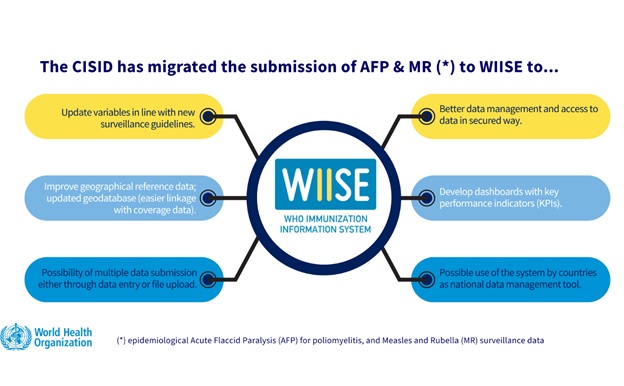
Managing Immunization Data has its history in the WHO European Region.
History has taught us that a full and effective global response to VPDs takes time, financial support and collaboration – and requires continued vigilance. (History of vaccinations), and the immunization programmes requires a robust, innovative and evolved system to manage the data to achieve WHO VPD control and elimination targets.
As a clear example of history, since 2003, Member States have submitted data in a web-based system called Centralized Information System for Infectious Diseases (CISID), or by email for further management through CISID. The CISID collect, analyse, and present data on VPD surveillance, namely on acute flaccid paralysis and poliomyelitis (AFP/polio), and measles and rubella (MR), in the WHO European Region.
As part of its strategy within the EIA2030, WHO European Region is strengthening the data management for VPD surveillance, including (AFP/polio, and MR). These data are routinely submitted by Member States to WHO Europe in line with the polio eradication and measles and rubella elimination efforts in the Region, which are reflected also in the EIA2030.
Following these efforts, the CISID system, in its current form, does not support the need of high-quality surveillance data, updated standard requirements for MR and polio surveillance, and accurate analysis of data at subnational level, including the triangulation of surveillance and vaccination coverage data. That´s the main reason behind the CISID replacement with WHO Immunization Information System (WIISE), which is a WHO corporate solution for integrated management of VPDs and immunization data.
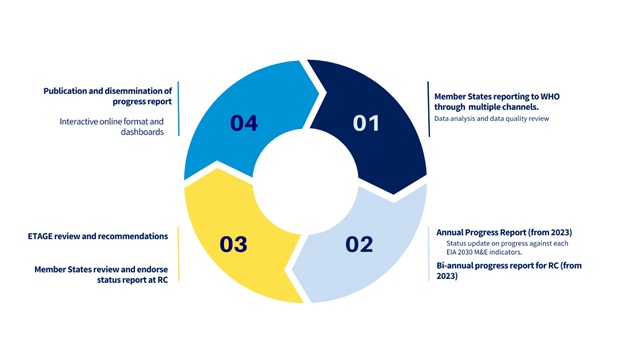
But…what is WHO Immunization Information System (WIISE)?
WIISE is a common platform to optimize the collection, management, analysis and dissemination of immunization and VPD surveillance data collected by WHO worldwide, while ensuring regional autonomy. It streamlines processes and workflows and improves the overall governance of immunization data across WHO. It is aligned with WHO transformation agenda around data management end-to-end processes and it´s based on corporate solution.
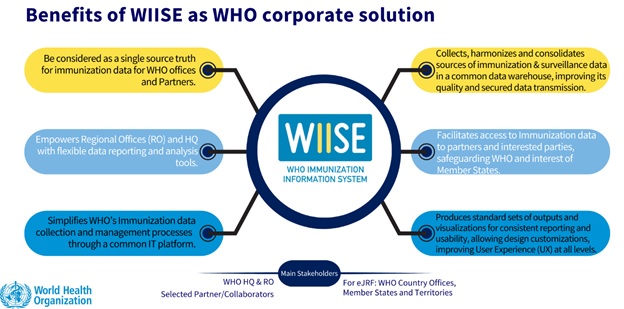
WIISE is a collaborative project between the three levels of the organization: Headquarters (HQ), Regions and Countries and key immunization partners to:
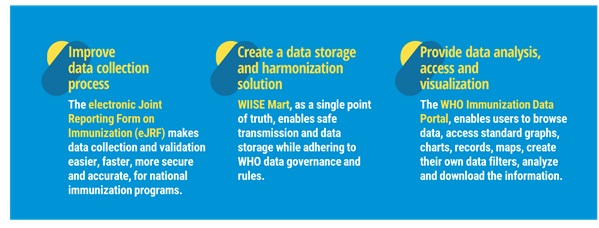
The importance of storing data.
WHO uses xMART technology, a customized solution, secure cloud-based data warehouse, for harmonizing and storing data for multiple health programs.
Using xMART technology, WIISE data warehouse provides a central location for global immunization data, as well as reference data such as the geodatabase. Each region manages their own section of the warehouse and uses data pipelines specific to their region. Designed and developed in collaboration between Regional Offices and HQ, WIISE Mart also uses Single Sign On (SSO) which follows WHO’s cybersecurity policies.
WHO/Europe is using WIISE for region-specific needs.
WHO/Europe is leveraging the capabilities of WIISE to ensure an easier, faster, quality checked and more secure VPD surveillance data submission by countries. By granting password-protected access to nominated WIISE focal points at country level, countries will also be able to browse and download their own database according to their user rights.
WIISE will enable development of data visualization features and generation of standard reports, such as on incidence rate, distribution of cases by time, place and person, completeness of reporting and surveillance performance indicators. Better management of geographical references will allow joint analysis of coverage and surveillance data at subnational level to identify under-immunized population.
Transitioning from CISID to WIISE, a WHO corporate solution, represents a sustainable and cost-effective solution for management of data at regional level, while ensuring both, regional and global needs, are addressed.
Country data is migrating to WIISE in WHO Europe.
As of today, historical AFP and Measles and rubella (MR) surveillance data reported to WHO until 2022 is already uploaded in WIISE, data entry forms for data collection are available, and data upload process is configured attending countries preferred data submission option. Multiple data submission options are offered aiming to minimize reporting workload to WHO, for example by enabling uploading of national surveillance data in any format to avoid double data entry or adaptation to WHO templates. Access to WIISE has been granted to all users that were nominated as national WIISE focal points. The system allows user specific roles, for example editing or viewing only rights, and national focal points can access only data from their own country.
Training was offered to all country users through in-person training in March and online training sessions in April. A period of two months will be used for piloting WIISE system and implement needed improvements. At the time of writing this article, around 16 countries that were trained in March are transitioning to WIISE and the launch of data submission for all other countries in the Region is imminent.
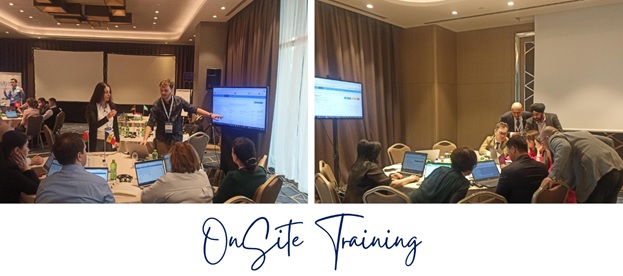
It is expected to complete the switch to WIISE for AFP and MR data submission and management in June 2023 and the Dashboards, tentatively, might be accessible by end of that month.
WIISE workshop in Istanbul, 13-14 March 2023
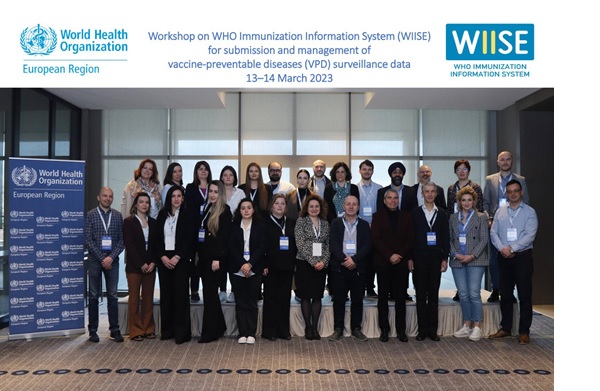
WIISE workshop in Istanbul, 15-16 March 2023
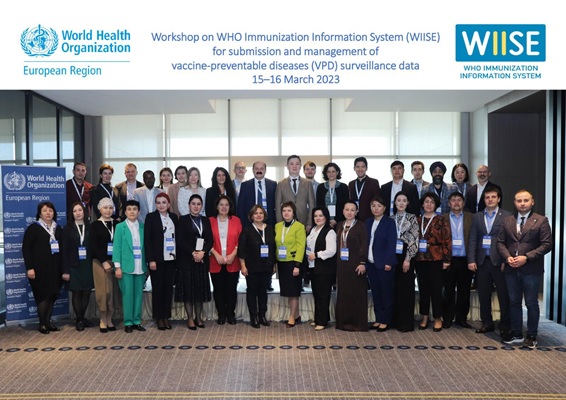
To ensure smooth transition from CISID and successful implementation of WIISE, WHO/European Region will be available to provide any needed support, including additional training, revision of preferred data submission modality, updating list of WIISE users at country level. If you are a country Focal Point interested, please contact This email address is being protected from spambots. You need JavaScript enabled to view it. (The same email can be used to request additional information on WHO/Europe experience to use WIISE for region-specific needs) needs)
Let´s keep on working together gathering immunization data that will help to leave no one behind.
---
Author: Immunization Analytics and Monitoring team, Vaccine-Preventable Disease and Immunization (VPI) Unit. WHO Europe Region
